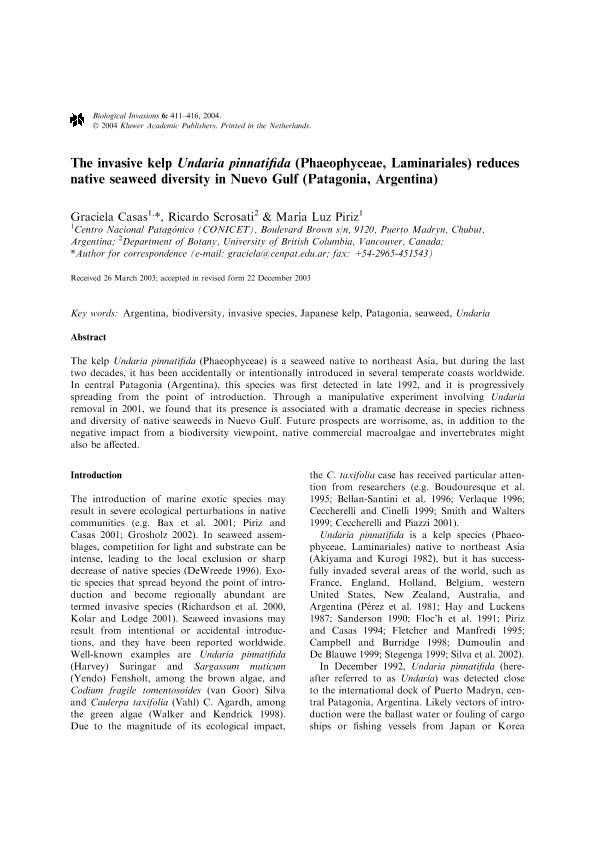Mostrar el registro sencillo del ítem
dc.contributor.author
Casas, Graciela Noemi

dc.contributor.author
Scrosati, Ricardo Augusto

dc.contributor.author
Piriz, María Luz
dc.date.available
2017-12-11T17:24:12Z
dc.date.issued
2004-12
dc.identifier.citation
Casas, Graciela Noemi; Scrosati, Ricardo Augusto; Piriz, María Luz; The invasive kelp Undaria pinnatifida (Phaeophyceae, Laminariales) reduces native seaweed diversity in Nuevo Gulf (Patagonia, Argentina); Kluwer Academic/plenum Publ; Biological Invasions; 6; 4; 12-2004; 411-416
dc.identifier.issn
1387-3547
dc.identifier.uri
http://hdl.handle.net/11336/30155
dc.description.abstract
The kelp Undaria pinnatifida (Phaeophyceae) is a seaweed native to northeast Asia, but during the last two decades, it has been accidentally or intentionally introduced in several temperate coasts worldwide. In central Patagonia (Argentina), this species was first detected in late 1992, and it is progressively spreading from the point of introduction. Through a manipulative experiment involving Undaria removal in 2001, we found that its presence is associated with a dramatic decrease in species richness and diversity of native seaweeds in Nuevo Gulf. Future prospects are worrisome, as, in addition to the negative impact from a biodiversity viewpoint, native commercial macroalgae and invertebrates might also be affected.
dc.format
application/pdf
dc.language.iso
eng
dc.publisher
Kluwer Academic/plenum Publ

dc.rights
info:eu-repo/semantics/openAccess
dc.rights.uri
https://creativecommons.org/licenses/by-nc-sa/2.5/ar/
dc.subject
Argentina
dc.subject
Biodiversity
dc.subject
Invasive Species
dc.subject
Japanese Kelp
dc.subject
Patagonia
dc.subject
Seaweed
dc.subject
Undaria
dc.subject.classification
Meteorología y Ciencias Atmosféricas

dc.subject.classification
Ciencias de la Tierra y relacionadas con el Medio Ambiente

dc.subject.classification
CIENCIAS NATURALES Y EXACTAS

dc.title
The invasive kelp Undaria pinnatifida (Phaeophyceae, Laminariales) reduces native seaweed diversity in Nuevo Gulf (Patagonia, Argentina)
dc.type
info:eu-repo/semantics/article
dc.type
info:ar-repo/semantics/artículo
dc.type
info:eu-repo/semantics/publishedVersion
dc.date.updated
2017-11-24T14:33:17Z
dc.identifier.eissn
1573-1464
dc.journal.volume
6
dc.journal.number
4
dc.journal.pagination
411-416
dc.journal.pais
Países Bajos

dc.journal.ciudad
amsterdam
dc.description.fil
Fil: Casas, Graciela Noemi. Consejo Nacional de Investigaciones Científicas y Técnicas. Centro Científico Tecnológico Conicet - Centro Nacional Patagónico; Argentina. Consejo Nacional de Investigaciones Científicas y Técnicas; Argentina
dc.description.fil
Fil: Scrosati, Ricardo Augusto. University of British Columbia; Canadá
dc.description.fil
Fil: Piriz, María Luz. Consejo Nacional de Investigaciones Científicas y Técnicas. Centro Científico Tecnológico Conicet - Centro Nacional Patagónico; Argentina. Consejo Nacional de Investigaciones Científicas y Técnicas; Argentina
dc.journal.title
Biological Invasions

dc.relation.alternativeid
info:eu-repo/semantics/altIdentifier/url/https://link.springer.com/article/10.1023/B%3ABINV.0000041555.29305.41
dc.relation.alternativeid
info:eu-repo/semantics/altIdentifier/doi/http://dx.doi.org/10.1023/B:BINV.0000041555.29305.41
Archivos asociados
